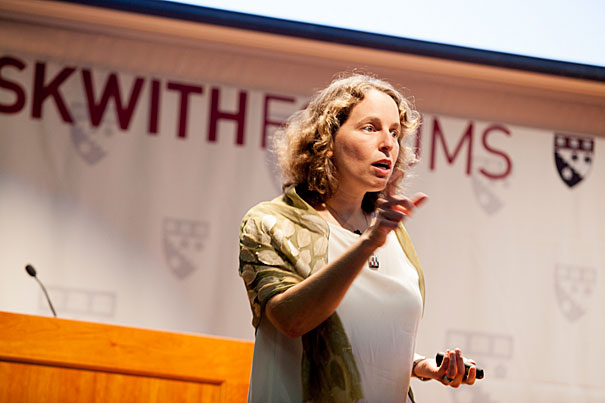
Meira Levinson, a political theorist and former Boston middle school teacher (photo 1), is piloting a new project that uses normative case studies to get educators to collaborate and think through ethical dilemmas. She spoke at an Askwith Forum alongside Harvard Graduate School of Education Dean James Ryan (left) and Robert Kegan, the William and Miriam Meehan Professor of Adult Learning and Professional Development (photo 2).
Rose Lincoln/Harvard Staff Photographer
New avenues in education
Faculty projects highlighted at Askwith Forum
Building on the University’s commitment to innovation and collaboration, the Graduate School of Education (HGSE) held an Askwith Forum Tuesday examining innovations in learning.
The event, which helped kick off the School’s first Teaching and Learning Week, was hosted by Dean James Ryan and featured developmental psychologist Robert Kegan, the William and Miriam Meehan Professor of Adult Learning and Professional Development, and Meira Levinson, an associate professor of education.
The HGSE professors introduced teaching projects aimed at tapping the potential of online learning and communicating educational theories in real-world settings.
Kegan, whose research focuses on adult learning, is working with lecturer Lisa Lahey to develop the first HGSE course on the edX platform, “Change Course,” which begins Jan. 20. Thus far, more than 24,000 people have signed up for the class on personal growth — six times the number of students Kegan has taught in all his 35 years at HGSE, he said.
Kegan said the idea took shape five years ago after the success of his Harvard Extension School classes. Now, using the depth and reach of the edX platform, Kegan hopes students will begin to identify and move past the obstacles that block their self-improvement goals, while at the same time providing important new data about what techniques and methods bring about measurable change and not merely the perception of change.
“It represents an effort to try to see whether through online learning you can support … the kinds of learning which are really essential to professional education,” Kegan said. “Learning which is not just getting you to know certain stuff, but can you do something different, can you actually behave in some new way?
“That’s the essence of what we’re trying to teach,” he said. “The whole course is bringing people into this whole new phenomenon, their own personal improvement goal, and seeing if we can help them change.”
Levinson, a political theorist and former Boston middle school teacher, is piloting a new project that uses normative case studies to get educators to collaborate and think through ethical dilemmas. (The project’s website, www.justiceinschools.org, went live this week.) Another aim, she said, is to find better ways to identify and articulate key issues and values involved in difficult teaching situations in the hope of arriving at a responsible plan of action.
By way of example, Levinson described a scenario in which an eighth-grader failing social studies and science had accumulated too many absences to meet the school’s criteria for moving on to high school. The student had shown remarkable improvement in her reading skills, but a tough family situation that kept her moving among several foster homes meant she wouldn’t be able to make up the credits without summer school — and with budgets tight, the district had canceled summer school for middle-schoolers. The girl’s teachers were conflicted over whether to hold her back, promote her, or send her to an alternative school that was known to be little more than a pathway to prison. Teachers and administrators often find themselves in such situations, and there are no easy answers.
“We all need to have conversations about the values that we stand for and what those values imply for action. Because we can have conversations about values that lead us to think that we agree with one another, but lead to very different decisions about action than we would anticipate,” Levinson said.
“We are obligated as educators and as people who care about education to work together civically and civilly, but that doesn’t mean always with agreement. We often have fundamental disagreements and we need ways in which to talk through those disagreements and to learn from one another,” she added.
Beyond the classroom, Levinson said she hopes the case study project will help connect educational theorists with policymakers and practitioners.
“Together, my goal is to help educators and policymakers learn from political and educational theorists, and vice versa, in order to create a more just world for children and the adults who care for and about them,” she said.





